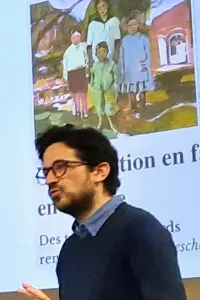- Accueil
- Recherche et innovation
- Annuaire des chercheurs
- Bongrand Philippe
Bongrand Philippe
Activités / CV
- Responsable du diplôme universitaire Cootopia
- Coordonnateur du projet de recherche LivEDspaces
- Correspondant recherche du LéA Correspondances urbaines - Urban Pals
- Membre de la Learning Community "Urban Education" de l'alliance universitaire européenne EUTOPIA
Ouvrages
Bongrand, P. (dir.) (2025). L’instruction en famille en France. Profils, mobiles et pratiques au tournant des années 2020, Rennes, Presses universitaires de Rennes, coll. : « Essais », 876 pages, https://books.openedition.org/pur/291151.
Bongrand, P., Carraud, F., Coopérative des savoirs (éd.) (2021). L’éducation des enfants dans le Morvan : quelles pratiques aujourd’hui ? Actes de la journée d’étude du 10 avril 2019, Lormes, 187 pages, https://hal.archives-ouvertes.fr/hal-03134673.
Meskel-Cresta, M., Nordmann, J.-F., Bongrand, P., Boré, C., Colinet, S., Elalouf, M.-L. (dir.) (2014). École et mutation. Reconfigurations, résistances, émergences, Bruxelles, De Boeck, coll. : « Perspectives en éducation et formation », 407 pages, https://shs.cairn.info/ecole-et-mutation--9782804184742?lang=fr.
Vasconcellos, M., Bongrand, P. (2013). Le système éducatif, La Découverte, coll. : « Repères », 5e édition, 2013, 126 pages, https://shs.cairn.info/le-systeme-educatif--9782707177506?lang=fr.
